The small Welsh town of Hay-on-Wye has become one of the world’s most famous book centres thanks to the extraordinary vision of Richard Booth. Booth started by opening a bookshop in the building he inherited from his uncle, and he participated in the ‘surplus book’ tenders of libraries in different countries, especially in America, and brought thousands of books to the town. However, he knew that creating a town full of books alone would not be enough. He had to build a strong and remarkable story that would make Hay-on-Wye famous. Booth’s extraordinary idea, blended with satire and humour, took off: On 1 April 1977, he declared Hay-on-Wye an independent ‘kingdom’ and crowned himself ‘king’. This attracted both local and international media attention. Hay-on-Wye became a cultural centre in the eyes of book enthusiasts and a centre of attraction for booksellers, collectors and book lovers.
The rise of large book chains, heavy tourism and the increasingly commercialised identity of the Hay Festival began to put a strain on local bookshops. Gentrification threatened the town’s independent bookshop culture. The ‘symbolic execution’ demonstration organised in 2009, just like the rebellion led by Oliver Cromwell against King Charles I in England, the booksellers planned an action against the ‘Kingdom of Booth’. They carried out a symbolic ‘execution’ by decapitating an effigy of King Richard Booth, thus attracting the attention of the press.
One of the organisers of the protest against the ‘King’ was Paul Harris, who had started his career as a bookseller under the guidance of Richard Booth. We spoke to his daughter Rachel about the legacy of Harris, who died in May last year, the transformation of Hay-on-Wye and the future of the bookshop culture.
How did your father being a bookseller affect you? What kind of family and home environment did you have?
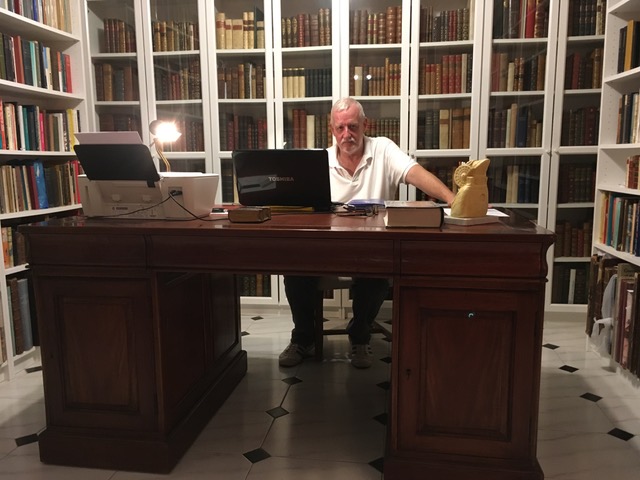
I didn’t live with my father when I was a child, my parents separated when I was about 4. Even before they parted ways, I don’t think he was around much because that would’ve been the time (late 80s/early nineties) that he travelled around the States with Richard Booth doing large book deals. I think Dad was always wedded to his work, travel, the bohemian lifestyle (though I think he would blanch at it being called bohemian!) and I imagine living in Hay, travelling to America and working with books came to represent a kind of freedom for him.
I would visit him in Hay when we were kids, a couple of times a year. I remember him having over some bookseller friends to drink cider and smoke roll up cigarettes and play Irish five card poker and he taught me how to play…I know that doesn’t sound like a ‘proper’ environment for a kid, but I remember the atmosphere being jovial and I liked that he didn’t treat me in an infantile way. He didn’t patronise or sugar coat the world. Later, he took a rental cottage in the town on Oxford Terrace, and he filled it with books to sell on the internet I think. The whole tiny house had books everywhere; the downstairs living room and kitchen was filled so I don’t think he could cook; I think he just used to heat up soup and eat sandwiches. Kind of a spartan lifestyle, especially after he quit drinking.
In my early teens I started to rummage through them, and I had a gothic sensibility, I was interested in confronting and facing the difficult and unseemly issues in life; I remember reading the books he had on historical murders, forensic pathology, war, anatomy, criminology. Visiting and spending time with the books was like being in a bibliophile version of a ‘house of curiosities’, one of those strange, macabre museums.
Later he upgraded to a shop, and he took the name Oxford with him, Oxford House books. He was becoming more formal and fastidious with his selling and collecting, very painstaking in archiving and managing it. Whenever I stayed, a couple of times a year, he never really stopped working from morning until night. Organisation was so important to him, everything being in the right place so he never lost a book or missed an order. When I was a teenager I used to just think he was being unnecessarily stress-headed, but now that I’ve taken on the books myself after his death I understand what a chore it can be.
Its become the second-hand bookshop centre of Hay-on-Wye. Can you tell us about Richard Booth and this transformation?
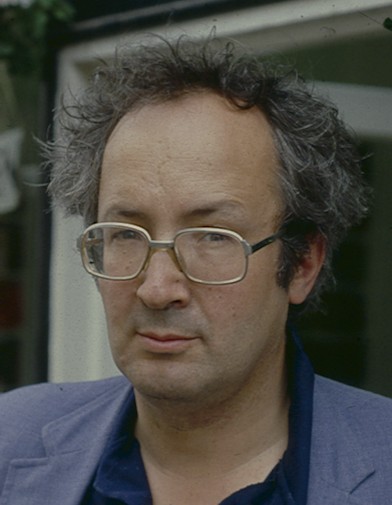
I never knew Booth myself, though I did meet him a couple of times and Dad would tell me stories about him. He was eccentric, funny, very clever, but difficult, I think. Dad said he would do offbeat stuff when they travelled together, like falling asleep in a room with very high radiators whilst wearing multiple coats and overheating himself. Or purposefully mistaking the item on a menu of ‘Shitakke mushrooms’ for ‘Shitcake mushrooms’ so he could harangue the waiter about it for his own amusement. He was a satirical man I think; Dad told me he, my father, once got beeped at by some impatient local actor in his car whilst he crossed the road to go to the dry cleaners on Oxford Terrace. After telling Booth, Booth apparently wrote in the local newspaper of some great, politically significant event wherein ‘a local man bravely blockaded the street to prevent celebrity cavalcade’. Something like that.
I think he used that theatrical, satirical sensibility to create the mythos around Hay-on-Wye. By making a crown and parading himself through the streets as the new king and all that stuff, he was able to add this colour and romance to the place that attracted people to it.
Can you tell us about the relationship between Booth and your father? What kind of booksellers were your father and Richard Booth?
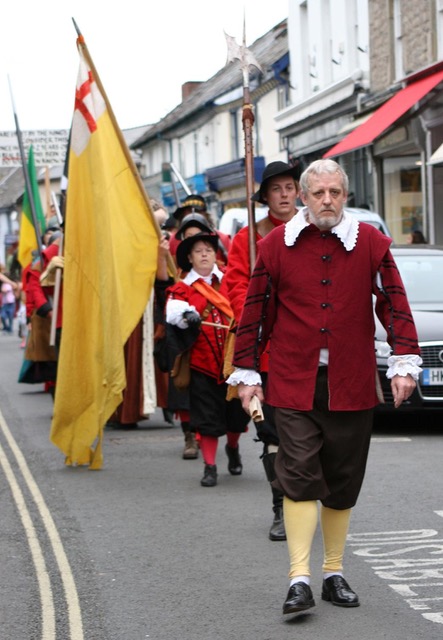
I think Booth was pretty important to my Dad because working with him and enabled him to really learn the trade of bookdealing on the job, and Dad used to tell stories about Booth with a lot of wit and humour, so in way, he had an admiration for him though their relationship blew hot and cold I think.
What was important to the town and the book culture that Booth started and sellers like my Dad and others helped build, was that the bookshops were second-hand, rare books, antiquarian books. The wonderful thing about Hay-on-Wye in its hey-day was being able to go into all these shops and find things you’d not find anywhere else, a readerly Aladdin’s cave of unique, unusual and special books, art, prints, letters. You can go to any town or city and find a chain book shop and buy the latest pop culture release, the latest novel or celebrity biography.
What did Booths declaration of a ‘kingdom of books’ and the idea of a symbolic monarchy aim to achieve? Can you tell us about them and the background to his ‘symbolic execution’ in 2009?
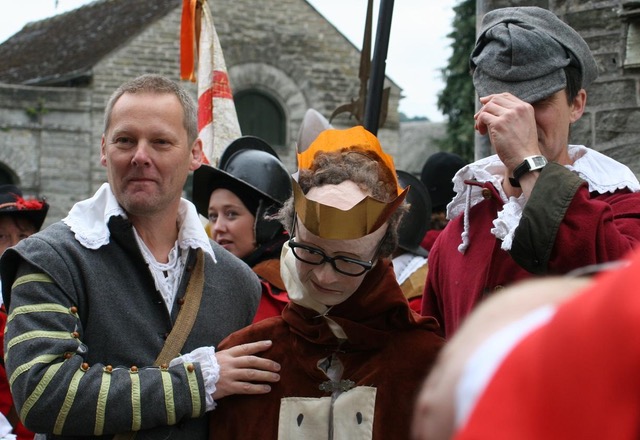
I don’t know a lot about the lead up to Booth making Hay into a symbolic micronation ruled by royalty; I know he also identified himself as a socialist so I’m not entirely sure how he squared that circle! I suppose though the ‘kingdom of Hay’ stuff was always just a clever publicity stunt to get press interest, which it really did.
The beheading was a follow on from that; Dad and other booksellers felt the town was gentrifying. It’s a common story; a town develops this quirky individuality with the book culture and the characters that attracted and the bohemian culture that created. Then well-meaning middle-class people attracted to that allure visit, and then the town becomes touristy and expensive and the booksellers themselves struggle to afford to operate. The Hay festival, was the big thing; my Dad has an issue with it because it was mainly focused on selling new books by celebrities and TV personalities and so it helped bring business to the bars and cafes, but did less for many of the bookshops themselves because a lot of festival goers didn’t necessarily want secondhand and rare books but modern books they could buy in any town anywhere. That’s what many of the booksellers felt. That’s what Dad felt.
He try to make his point on BBC radio but the London-based journalists were dismissive. He felt that in days gone by Booth might’ve engaged in some publicity stunts to draw attention to the problems of the festival and the gentrification but that he had lost interest in the issues of the town. So, my Dad and some pals thought they’d pull their own stunt instead, the beheading.
It got members of the English literati talking, it was in the satirical magazine Private Eye as well as newspapers like The Guardian. But I think many of the problems for the booksellers were already too deep, it was a last gasp, a last hurrah for the old ways of the town. Its’ still a cute place to visit and there are still some secondhand bookshops there, but most have closed down. It’s not what it was.
Can you tell us about the Oxford Book House story? Is it still active today after your father’s death?
My Dad eventually left Hay; I think lots of reasons, but a big reason was that the town and the bookselling culture had changed so much. He spent the last years of his life in Spain, predominately focused on his most rare and valuable books, his ‘pension’. I brought the rest of his collection back to UK to where I live in Haworth in the summer of 2024 and I am considering starting my own online book business, but it would be a labour of love because it would be tricky to make money in the era of ‘Amazon’ and the big warehouse online sellers.
What do you think about the situation of independent bookshops in the face of factors such as digitalisation and the rise of big publishers?
I think it’s difficult to run any kind of independent shop now in the UK, the cost of running daily expenses, people read less, they want less cluttered more minimalist homes, they shop online. It’s a difficult climate. And who knows what will happen with the fast developments on AI. I’d like to hope that it will make people interested in older books again, if they want to know for sure they were written by real human being because with newer books it might become hard to tell. But who knows.
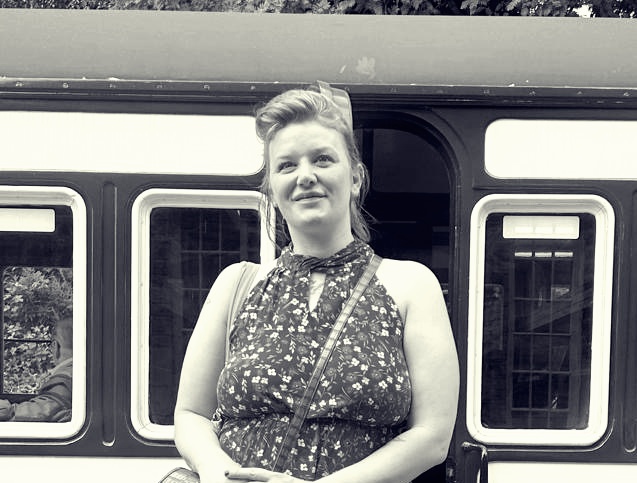
What a fascinating story. I wish I had known it sooner, being a bibliomaniac myself; I might have visited the town. I certainly hope she becomes a bookseller herself, to continue her father’s legacy.
I am very sorry to hear that Paul Harris has passed away. Fresh out of university, I went to work for Richard Booth in about 1992/3 and worked there for about five years. Paul was one of my colleagues and working for him on bok- buying trips and in the shops I got to know an erudite man with very funny yet dry wit. Working for King Richard was an interesting period in my life and we were all inmates in his surrealistic madhouse. It seemed that everyone who worked for the King seemed to be eccentric on some level. I did see Paul a few years ago when I returned to the area to visit my parents. He’d started his own bookshop I remember and seemed happy and contented. Visiting Hay-on-Wye these days is seeing a very different beast – a tourist trap with gentrification and the internet putting an end to the fun of finding a bargain book or something unavailable on the high street. Richard’s flagship store, The Limited, was bought by an American, I think, and stepping inside you could be entering a generic Waterstones – the character of the place having gone along with Richard Booth…